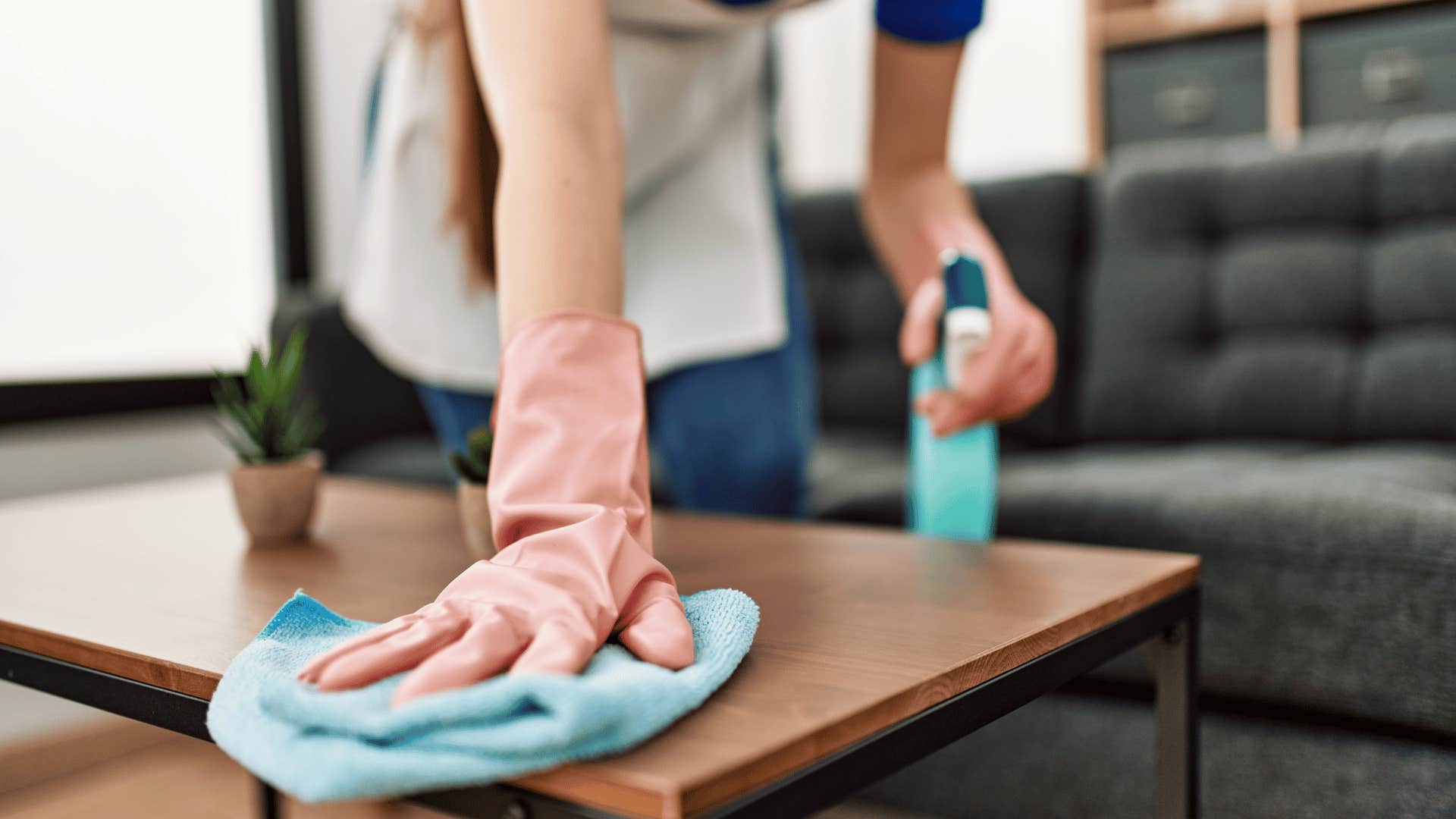If Your Parents Taught You These 15 Skills Growing Up, You're Likely A Happy Person Now
How parents can pass down happiness through the skills they teach their children.
 Jose carlos Cerdeno | Canva
Jose carlos Cerdeno | Canva Happiness seems to be the ultimate — yet most elusive — of goals. You want to understand how to be happy with your family, work, health, finances, relationships, and future. And while you may feel happy for brief or fleeting moments, soaking in an adrenaline rush and energy, the feeling seems to fade quickly with the next less-than-positive person or situation you encounter.
But there's more to happiness than just experiences and fleeting moments. There's a science behind why happy people are, well... happy — and it starts with developing regular habits that increase your mental health and emotional state each day.
According to numerous scientific studies, when you routinely do things that make you happy, you'll experience happiness more frequently and it will have long-lasting effects in your life. By doing several small things each day, you're beginning to shift your mindset from a negative bias to one that's focused on keeping you happier.
Happiness isn't just an emotion that you experience as a response to outside stimuli. It's an emotion that parents can cultivate a little every day with simple skills they can teach their kids as they grow up.
If your parents taught you these skills growing up, you're likely a happy person now:
1. Choose to focus on the positive
 Yuri A / Shutterstock
Yuri A / Shutterstock
Choose one thought per day to focus on when you feel down; determine what it will be when you first wake up. This will be your go-to topic or happy thing when you want to raise your energy and feel better.
You can focus on your beloved dog or cat, a child or loved one, the best kiss you've ever had, a family vacation, or a moment of celebration — anything that makes you feel instantly happy. Each time you feel your energy dropping into negative feelings like fear, anger, frustration, or resentment, call upon your happy thing and stay in that moment for as long as possible (17 seconds minimum.)
Spending time thinking happy thoughts might sound simplistic, but it works. As you practice, you'll start to feel happier more often.
This is a method of "positive psychology," and works to help your brain foster a positive attitude. Essentially, you're putting your brain on a detour from the negative aspects of a situation, and helping push positive affirmations of happiness and peace instead.
This gives you a sense of well-being that will ease the negative emotion you're feeling about whatever problem arises. In addition, you'll attract more positive people and situations to you based on the universal law of vibration — like attracts like — which is working 24/7, whether you believe it or not. In other words, this one happy habit of refocusing your energy draws more into your life about which to be happy.
2. Don't take responsibility for someone else's happiness
 fizkes / Shutterstock
fizkes / Shutterstock
If you think you can make other people happy, not only are you signing up for an unwinnable game, you're enabling them to be victims, rather than empowering them to feel happy by creating their happiness. You may have heard, "Life is 10 percent what happens to you and 90 percent how you react to it," by pastor Charles R. Swindoll.
If you've adjusted your reactions or your responses (a response is conscious; a reaction is often unconscious) to improve your happiness, you know this to be true.
You may believe that by showing others you're willing and able to help meet their needs, you're hoping they will, in turn, do the same. However, this behavior is not only robbing them of the ability to gain control of themselves but is also robbing them of their happiness.
You're expecting others to reciprocate what you've done for them, which means you're still relying on them to make you feel happy. And, by trying to take care of everyone else's happiness, you ultimately end up neglecting your own needs.
This will leave you feeling drained and miserable and is a huge barrier to your sense of fulfillment and emotional state.
3. Practice genuine gratitude
 Prostock-studio / Shutterstock
Prostock-studio / Shutterstock
Gratitude is the most positive of energies; it attracts positive situations and people. Research shows that what you focus on in your thoughts, words, and actions, is what becomes dominant in your life.
In other words, if you feed your anxiety, it will grow, rather than diminish. This is also a cornerstone of the Law of Attraction.
By focusing on or worrying about the things that make you unhappy — whether you can or can't control them — you're inadvertently putting all of your energy into making sure that's all you see in life.
Changing your mindset will help you stop focusing on the bad things, which will decrease your stress and improve your overall life satisfaction. Think about whether you compare your situation to one that's worse or better; in comparison to something worse, yours will look better.
It's a quick way to feel happy because it helps you realize your situation isn't as bad as you originally thought. Gratitude for small things has a huge impact on happiness.
For example, when you're stuck in traffic on the way to work, you can complain about it or you can be grateful you have a vehicle. If it's sunny in that traffic jam, be grateful for the beautiful day. If it's raining, be grateful that you're snug and warm inside the car. There's always something to be grateful for, no matter how small.
4. Avoid people who continually bring you down
 Yuri A / Shutterstock
Yuri A / Shutterstock
There's a lot of truth to the saying "Misery loves company." If you have negative friends or co-workers, pay attention to how you feel around them.
Do you feel happy or dragged down? Remember: Happy isn't something you are; happy is something you do. And when you're surrounded by people who can't see anything to be happy about, they'll ultimately convince you to do the same.
Studies show that happiness is affected by several factors, one of which is your personality type. Your social connections are important; they'll influence the way you view the problems in your life, and whether you'll feel you can accomplish goals or shouldn't even bother.
Want to be one of the happy people? Hang out with people happier and more willing to try and feel good rather than bad.
5. Do the things that bring meaning to your life
 Dean Drobot / Shutterstock
Dean Drobot / Shutterstock
You may start unhappy, even though you're going for your dreams and living your life. But if you're not filling your life with meaningful events, it can still make you feel like you're not fulfilled.
And one of the simplest ways to be happy is to take part in cultural events in your area that you enjoy. This could be anything from joining a club to seeing a play or visiting a museum.
A 2011 study showed that there was a connection between people engaging in these types of fun events and lower levels of anxiety and depression. So plan out your week, fill it with things that make you happy, and then do them! Determine what makes you happy.
What are you doing when you feel your best? Where are you? Who, if anyone, are you with?
Are you doing an activity like yoga, hiking, reading, hanging out with friends or meditating, having a dinner party, or visiting family? Schedule your "me time" and figure out what you need to help keep your sense of life fulfillment high.
6. Don't put off dealing with your problems
 Yuri A / Shutterstock
Yuri A / Shutterstock
A toleration is something you're putting up with instead of dealing with. You may not realize how many things you're tolerating in life that are negatively impacting your happiness.
For example, I had a small piling system of seemingly important papers that I would move from my desk to the floor and back again, rather than just taking a few minutes to sort it and add to an appropriate filing system.
Three months went by and I only sorted the pile because a friend was going to be staying with me — I wanted my desk to look neat. It took all of 20 minutes.
The frustration and stress that stupid pile caused over three months was huge, and took only a few minutes to fix. This is driven by a sense of anxiety that's caused by procrastination.
When you have something hanging over your head — even something minor — it can increase your anxiety and stress levels and lead you to feel unhappy. By taking the time to stop procrastinating or "tolerating" the problem and fixing it, you'll save yourself a lot of heartache and ease your stress.
7. Practice kindness
 Dragana Gordic / Shutterstock
Dragana Gordic / Shutterstock
Did you know that complimenting someone else can make you feel good about yourself? Studies show that when you're kind to other people, no matter how small the gesture, you're improving your happiness levels.
The studies suggested that doing one small act of kindness for someone else every day for as little as 10 days could make your life satisfaction level improve. So next time you like someone's new haircut, tell them. Or, if your new mom friend desperately needs some sleep, offer to watch the baby for an hour.
Being kind will not only make other people feel good, it will make you happier, too. And don't forget to be kind to yourself as well, since studies show it's imperative for a happy life.
8. Spend time in nature
 Pheelings media / Shutterstock
Pheelings media / Shutterstock
People often spend so much time closed up in their homes, that they forget that recharging yourself in nature is one of the best ways to decrease stress and anxiety and improve your happiness. Walking in the park, or even just sitting and admiring the trees can improve your mental health and make you feel happier.
Research has determined that when people spend time walking outdoors in nature, they have an easier time shutting down ruminations — that is, repetitive negative thoughts — than those who walk outdoors in the city. Nature is naturally soothing to humans, so spend some time just admiring the scenery!
9. Smile more often
 Rido / Shutterstock
Rido / Shutterstock
In one of the easiest ways to fake it 'til you make it, you can trick your brain into not being so sad by smiling more — really! The catch? You have to smile like you mean it, rather than wearing a fake smile, which can decrease your happiness levels.
By putting a real smile on your face, you're telling your brain it's sending out the wrong signals, so its course corrects. Now, just forcing yourself to smile isn't going to make an issue better long term, but when you think about something that brings a smile to your face, like your child, or a vacation you took, you're coupling smiling with the emotional connection of that memory, which will put you in a better mood.
10. Exercise regularly
 Drazen Zigic / Shutterstock
Drazen Zigic / Shutterstock
As Elle Woods said in Legally Blonde, "Exercise gives you endorphins. Endorphins make you happy. Happy people just don't kill their husbands."
By exercising as little as 10 minutes per day, you're setting yourself up for getting those endorphins, which will increase your happiness every single day. Go for a walk, or do a couple of squats on your lunch break. You'll not only feel healthier, but you'll be happier, too.
11. Create a regular sleep routine
 Prostock-studio / Shutterstock
Prostock-studio / Shutterstock
Sleep is one of the most important functions of your body, yet as many as 70 percent of American adults don't get enough sleep every night. Yikes.
If your sleep habits are like most Americans, they're pretty poor. It's important to practice good sleep health, which means eliminating electronics from your bedroom, going to bed at a set time every night, and waking up at a set time each morning; even on days off.
By doing this, your body will eventually learn when to start giving you the signals to go to sleep, and more easily go into REM sleep, which is the restorative part of sleep that makes you feel well-rested when you wake.
12. Eat healthy foods
 Dragana Gordic / Shutterstock
Dragana Gordic / Shutterstock
There's more truth to "You are what you eat" than you know. If you're not eating a diet rich in vitamins, minerals, healthy carbohydrates, and protein, you'll feel it in your emotions — and everywhere else, too.
Choose foods that will nourish you. Pack yourself some fruit or healthy alternatives to the vending machines at work, and choose salads and vegetables as much as possible.
Also, make sure you're not consuming sugary soda all day. One Coke has about 39 grams of sugar in it, which exceeds your recommended daily sugar intake by almost 32 percent for women and 10 percent for men in just a single can.
Have sugar in moderation overall, since it will add to your waistline and your unhappiness. Studies have found that high amounts of refined sugar in your diet are associated with higher rates of depression. Make sure you're drinking plenty of water!
13. Acknowledge your negative emotions
 fizkes / Shutterstock
fizkes / Shutterstock
One of the worst things you can do when feeling sad or overwhelmed is to pretend those feelings don't exist. Having and maintaining a positive attitude doesn't mean you won't ever feel sad or dissatisfied by something.
Take a moment when you're feeling down to validate and acknowledge those feelings. Then, give yourself time to think about why you might feel that way, and what you can do to feel better.
If you don't have an answer, then try to do something you love: practice kindness, maybe spend a moment in meditation, or go for a quick walk to clear your head. Your feelings aren't "good" or "bad," and you have them for a reason. Acknowledging your emotions helps you reframe them and learn how to let go and move on quickly.
14. Socialize with friends
 DavideAngelini / Shutterstock
DavideAngelini / Shutterstock
If you want to be happy, spend time with the people who make you smile! Having a good time together, building fond memories, eating great meals, and getting new experiences are all part of building your happiness reserve, which will help you call up more of those memories when you need them.
A 2019 study even determined that people's health and wellness could be accurately predicted based on their social network, essentially linking a direct correlation between your circle of friends and your level of happiness.
This is largely because friends are often an emotional support group for problems, partners for new activities, and people you can laugh with — all of which increase your happiness and leave you with a "glowing" feeling afterward.
According to the study, your friends' activities may even encourage you to make healthier decisions, like losing weight together or quitting smoking, which contributes to your overall health and will help you maintain good mental and physical health for longer. Surround yourself with the people you love and they will enrich your life in more ways than one.
If you can't spend time with someone in person, try weekly video chats, plan online games you can play together, or even build playlists you can listen to or have monthly book clubs. If you don't have people in your area, then try a site like Meetup, which will help you connect with other people based on the common hobbies you share.
15. Declutter your space
 Krakenimages.com / Shutterstock
Krakenimages.com / Shutterstock
When you're stressed and unhappy, it can be easy to let things slide in favor of trying to relax and find ways to feel happy again. Perhaps your room or even your whole house is messy or cluttered because of this.
Unfortunately, a cluttered space can add to your overall unhappiness. The link between messiness and depression is so prevalent sites are showcasing "before and after depression" photos of when people clean up the space they've let slide for weeks or months. Conversely, people with clean spaces are healthier and more relaxed.
So decluttering your living area is a big step toward improving your happiness! When you add up all the things you have to do in a day, it can easily feel overwhelming to also clean your home, but by breaking your tasks down into more manageable "bite-size" pieces, you can keep it from stressing you out.
Choose one space in your home — it can be a small area, like your desk, or a larger area, like your bathroom. Set a timer on your phone for 15-20 minutes and remove anything that doesn't belong back to its regular place.
If it doesn't have a regular place, then set another timer and sit down with like items to create an organized spot for them. It isn't much at once, but it will add up over time.
Your process to be happy is multi-fold: find things to be grateful for in all situations, be kind and courteous to others while realizing they are responsible for their happiness, shift toward positive people and situations and news, zap those tolerations, and use your happy thing as a trigger for feeling good.
You will notice a huge difference. Habits take time to form, so practice, practice, practice.
Kelly Rudolph is a Certified Life Coach and Hypnotherapist who helps her clients manage stress and experience personal growth through greater confidence.
